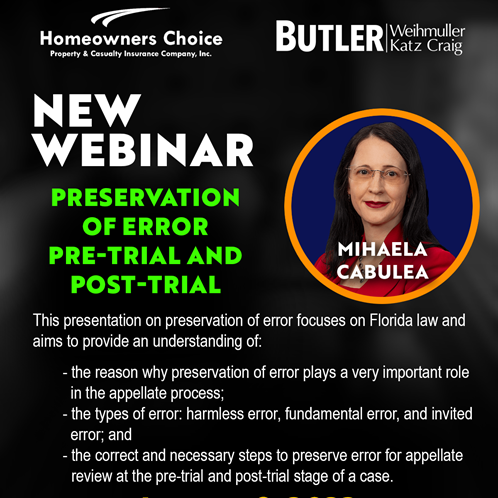
Orders permitting/denying pursuit of punitive damages soon to be immediately appealable
Overview | Blog Posts | Appellate | Mihaela Cabulea | Related | Print | Share
January 7, 2022
Some Florida practitioners and appellate courts have long pointed to the need to amend the rules of appellate procedure to allow for an interlocutory appeal of an order granting or denying a motion for leave to amend to assert a claim for punitive damages. For example, the Third District Court of Appeal in TRG Desert Inn Venture, Ltd. v. Berezovsky, 194 So. 3d 516, 520 n.5 (Fla. 3d DCA 2016) urged the Florida Bar’s Appellate Court Rules Committee (the “Committee”) to review Florida Rule of Appellate Procedure 9.130(a)(3) (Proceedings to Review Nonfinal Orders and Specified Final Orders) and consider including “in the rule’s catalogue of appealable, non-final orders a trial court’s order granting a motion for leave to amend to add a punitive damages claim.” As grounds for the recommended change, the court noted that the granting of a motion for leave to amend a complaint to assert a punitive damages claim can be a “game changer” because it subjects the defendant to financial discovery that would be otherwise off limits. Id. Furthermore, it potentially subjects the defendant to uninsured losses, since Florida public policy “prohibits liability insurance coverage for punitive damages assessed against a person because of his own wrongful conduct.” Id. (quoting Int’l Realty, Inc. v. Dade Underwriters Ins. Agency, Inc., 617 So.2d 455, 459 (Fla. 3d DCA 1993)).
On January 6, 2022, the Florida Supreme Court issued an opinion adopting an amendment proposed by the Committee following a referral by the Florida Supreme Court, amending Florida Rule of Appellate Procedure 9.130 to include in the list of appealable nonfinal orders, orders that grant or deny a motion for leave to amend to assert a claim for punitive damages. [i] From a practical perspective, this is an important change, as previously, an order granting leave to amend to assert a punitive damages claim was only reviewable by certiorari, which imposes a much more stringent standard for review. In addition, in a certiorari proceeding, the appellate court has no authority to review a trial court’s determination that there has been a reasonable showing by evidence in the record or proffered by the plaintiff that would provide a reasonable basis for recovery of punitive damages. See, e.g., Globe Newspaper Co. v. King, 658 So. 2d 518, 519 (Fla. 1995). Instead, the appellate court’s authority would be limited to determining whether the trial court complied with all applicable requirements set forth in section 768.72, Florida Statutes, before granting leave to assert a punitive damages claim. See, e.g., Varnedore v. Copeland, 210 So. 3d 741, 744 (Fla. 5th DCA 2017).
Justice Labarga filed a dissenting opinion, lamenting the implications of the majority’s opinion. In his view, the availability of interlocutory appeal will result in unnecessary and unwarranted delays in civil actions raising claims for punitive damages, adding to the caseload of appellate courts. Furthermore, he anticipates that some claimants in civil cases may reluctantly forgo meritorious punitive damages claims in order to avoid the delays caused by the availability of an interlocutory appeal. He noted that during oral argument, counsel for the Committee pointed out that in a 2018 fifty-state survey, no other state had a similar rule, which makes Florida an outlier. He rejected the argument that an interlocutory appeal would be necessary to protect a defendant’s right to privacy of financial information, noting that the right can be protected by a confidentiality order entered upon the request of the disclosing party. This, however, is just a partial solution which is not designed to prevent discovery of confidential financial information to the plaintiff, but merely to make such information unavailable to third parties or nonparties. Whether the availability of this new type interlocutory appeal will have the unintended consequences feared by Justice Labarga remains to be seen. But it is just as likely that it will prompt the parties in certain cases with meritorious punitive damages claim to settle the case and forgo an interlocutory appeal.
The rule will take effect on April 1, 2022. This raises the question of what to do if confronted with a motion for leave to amend a complaint to include a claim for punitive damages before the rule takes effect. It is very unlikely a court of appeal will find the rule has retroactive application. See, e.g., Sarasota County Pub. Hosp. Dist. v. Venice HMA, LLC, 325 So. 3d 334, 339 n.4, 346 n.8 (Fla. 2d DCA 2021) (discussing another amendment to Florida Rule of Appellate Procedure 9.130(a)(3) and finding that the court was constrained to review the challenge before it through an extraordinary writ, because “the version of rule 9.130(a)(3) in effect when the circuit court entered the subject order and the [petitioner] filed its petition only authorized appeals of nonfinal orders that determined ‘as a matter of law, a party is not entitled to sovereign immunity” and further noting that if asked to apply the rule retroactively it would have declined to do so.) This would indicate that it is imperative that the order on the motion be issued on or after April 1, 2022 for it to be appealable pursuant to Florida Rule of Appellate Procedure 9.130(a)(3)(G). Depending on the procedural posture of the case, the presiding judge, and other strategy reasons, it might be sound strategy to have such a motion heard after the new rule takes effect.
[i] In Re: Amendment to Florida Rule of Appellate Procedure 9.130, No. SC21-129, 2022 WL 57943 (Jan. 6, 2022) (creating subsection 9.130(a)(3)(G) of Florida Rule of Appellate Procedure 9.130).
For any further questions, please contact Mihaela Cabulea.



